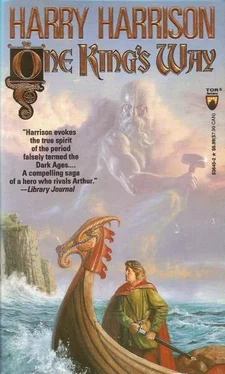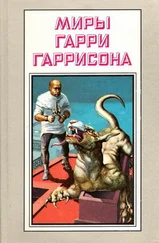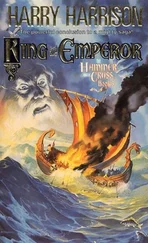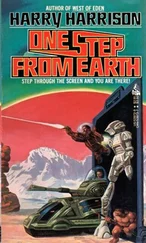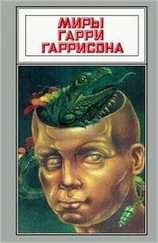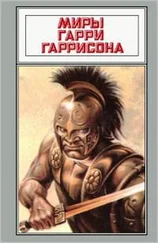“Across to the Dutch shore,” said Shef. “Then up along the coast past the Frisian islands and into Danish waters. That is the main route the pirates come. We will sink every pirate ship we see. From then on any who wish to invade us must take the long sea-crossing from Denmark. But in the end we will destroy their bases, seek them out in their own home-ports.”
“The Frisian islands,” muttered Brand. “The mouths of the Rhine, the Ems, the Elbe, the Eider. Well, I will tell you one thing, young man. All that is pilot water. You understand what I mean? You will need a pilot who knows the channels and the landmarks, so he can find his way by smell and hearing if he needs to.”
Ordlaf looked stubborn. “I've found my way all my life with no more than lead, lookout and log-line. Nor do I feel my luck has got any the worse since I left the monks who were my masters and found the gods of the Way.”
Brand grunted. “I say nothing against the gods of the Way.” Again, both he and Ordlaf touched their protecting pendants, and this time Shef, with a self-conscious gesture, reached also to pull out his strange ladder-like charm, the token of his patron Rig. “No, the gods may be well enough. But as for lead, lookout and log-line—you'll need more than that off Bremen! I say it, I, Brand, Champion of the men of Halogaland.”
The listening workmen shifted and muttered. Some of those new to the yards nudged each other, pointing at the unfamiliar pendant of Rig.
Sun slanted through the high windows of the great library in the cathedral of Cologne, to fall on the open pages of several books spread across the massive lectern. Erkenbert the deacon, his short frame barely able to see its upper edges, stood lost in thought. He was alone. The librarius , knowing he had the archbishop's favor, and approving the intentness of his research, had left him to himself, even with the great and precious Bible, written on the skins of eighty calves.
Erkenbert was comparing texts. Could the fantastic tale that the archbishop Rimbert had told them days before possibly be true? It had convinced everyone else at the meeting, archbishops and counselors alike. But then it had flattered their pride, appealed to their sense of themselves as a nation, and as a nation continually rejected and undervalued by the power of Rome. Erkenbert did not share that feeling—or at least not yet. The English nation, remembering its conversion by the blessed Pope Gregory, had long boasted its loyalty to the Popes and to Rome. But what had Rome sent in return? If what Rimbert said was true, then maybe it was time to be loyal… elsewhere.
The texts, now. First among them was one that Erkenbert knew well, could have recited in his sleep. Nevertheless, important to look again. The four gospellers' accounts of the crucifixion of Christ all told slightly different tales—proof of their truth, of course, for who does not know that four men seeing the same thing will pick different parts of it to repeat? But John—John said more than the others. Turning the great, stiff pages, Erkenbert found the passage he wanted and read it, whispering the Latin words softly to himself and mentally translating them into his native English.
“… sed unus militum lancea latus eius aperuit. But one of the soldiers pierced his side with a lance.” With a lance, thought Erkenbert. With a Roman soldier's lance.
Erkenbert knew better than most men what Roman soldiers' weapons looked like. At what had once been his home at the great Minster of York, there had still remained standing much of what was formerly the headquarters building of the Sixth Legion of Eboracum . The legion had left York and Britain four hundred years before, called away to fight a civil war on mainland Europe, but much of its arsenal had remained behind, and much of what had not been stolen or used still lay in the vaults. The imperishable bronze fittings for the catapults Erkenbert had made for the heathen Ivar had been genuine old work, as good as the day they were made. Iron rusted, but for all that Erkenbert had seen on its stand, kept cleaned and polished as a trophy, the full panoply of a Roman legionary, helmet, cuirass, short-sword, greaves, shield and of course the iron-shafted Roman javelin, the pilum . Also called a lancea .
Yes, thought Erkenbert, that could have happened. And no question but that the lance, the Holy Lance, the lance that had pierced the side of the Son of God himself, could have survived physically. He had himself seen and handled weapons that might be as old.
But who might have thought to preserve such a thing? It would have had to be someone who recognized its importance at the very moment of its use. Otherwise the weapon would have gone back to the barracks, been mixed with a thousand others. Who could have set aside such a weapon? Not, thought Erkenbert, for all the archbishop had said, the pious Jew Joseph of Arimathea, whom John the gospeller mentioned four verses later. Such a man, if a disciple of Jesus, might well have been able to beg the body from Pilate, and to preserve the holy chalice in which Jesus had celebrated the Last Supper—though John said nothing of that. He would not have been able to gain possession of an infantry issue weapon from the Romans.
But the centurion, now. Erkenbert turned the pages of the Bible thoughtfully, moving from one Gospel account to the next. The centurion was mentioned in three out of four, and in all three he said almost the same words: Luke, “truly this was a righteous man,” Mark, “truly this man was the Son of God,” Matthew, “truly this was the Son of God.” And in the fourth, in John, might the writer not have meant the centurion by “one of the soldiers”? If the centurion pierced the side of Jesus, as was his duty, and had seen or felt the miracle—what easier than for him to keep and treasure his own lance?
Now where did the centurion go after the Crucifixion? Erkenbert turned to another book, small, shabby, untitled, a book it seemed of letters, one after another, prattling of land and loans and debts, written by many authors, the kind of thing many efficient librarii would have sent to be scraped and re-used. Erkenbert fixed on the one of which Rimbert had told him. It seemed plain enough. A letter from Roman times, written in Latin—not good Latin, Erkenbert noted with interest, the Latin of a man who knew only the words of command, and to whom grammar was a mystery—and said at the top to be from one Gaius Cassius Longinus, centurion of Legio XXX Victrix. Describing in admiring terms the crucifixion at Jerusalem of a troublemaker, and now sent to the centurion's home at—Erkenbert could not read the name, but certainly something German, Bingen or Zobingen maybe.
Erkenbert pulled at his lower lip. A forgery? The letter had clearly been copied several times, but that was natural over the centuries. If the copier had been concerned to stress its importance, would he have made such a shabby copy, with such inferior penmanship? As for the tale itself, Erkenbert had no doubt that a centurion in Jerusalem in the Year of Our Lord 33 might well have been from the Rhineland. Or from England for that matter. Had the great Constantine, who had made Christianity the religion of the Empire, not himself been proclaimed Emperor on the very site of Erkenbert's own Minster at York?
The critical text was the third, a modern work, written no more than thirty years before, or so Erkenbert judged from its style. It was an account of the life and the death of the great Emperor Charlemagne, whose degenerate descendants, in Archbishop Gunther's view, now incompetently ruled the West. Much of it was familiar to Erkenbert already—the Emperor's campaigns, his fostering of learning. As Erkenbert never for a moment forgot, Charlemagne had called Alcuin, another man of York, another humble deacon like himself, from the English minster to control the destiny and the scholarship of the whole of Europe. Alcuin had been a man of great learning, true. But in literature, not in the practical arts. He was not an arithmeticus , as Erkenbert was. There was nothing to say an arithmeticus might not be as great a man as a poet.
Читать дальше
